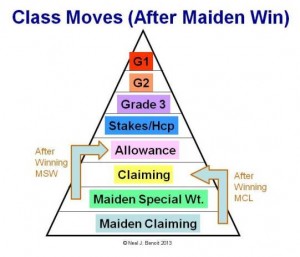Apr 12
2015
In a prior article we introduced Claiming races. Click here for a review of that article. The type of races described in that article are open to any horse where the owner is willing to offer the horse for the claiming price of the race. But, there are other types of Claiming races where a horse can be entered only if they meet certain “conditions.” It is these type of races that we will focus on in this article. We’ll start with the simple, and work our way up to the more complex. Read More >>
Jan 13
2014

Panning for real gold can be a tedious task. But, on the occasion that a precious nugget is left behind in the pan … oh what joy that can bring. Sometimes when I’m handicapping, I think of myself as panning for gold. A lot of sandy material gets washed over the side of the pan as I look through a horse’s Past Performances (PPs). I think of sandy material as information that everyone else can plainly see. For example, seeing that a horse has won lots of races, has the highest Beyer Speed figure of anyone in the field, or consistently runs well at the distance of today’s race. Good information, but it will be used by everyone in deciding on which horse to bet on. In other words it will be directly reflected in the odds of the horse. No gold to be had there, only sand.
Read More >>
Oct 28
2013
In a prior article we introduced Claiming races. Click here for a review of that article. The type of races described in that article are open to any horse where the owner is willing to offer the horse for the claiming price of the race. But, there are other types of Claiming races where a horse can be entered only if they meet certain “conditions.” It is these type of races that we will focus on in this article. We’ll start with the simple, and work our way up to the more complex. Read More >>
Sep 6
2013

In a prior article we introduced the topic of Claiming Races and some basic information about how they work. Click here for a review of that article. Next we’ll discuss the topic of “Jail Time” and what in means in the context of Claiming Races.
After a horse is claimed out of a race, most states require that the new owner enter the horse at a 25% higher claiming price, if that horse runs within a month following the claim. It is during that period of time the horse is considered to be “in jail.” If the horse does not run during the month after the claim, he is considered to be “out of jail” and can then be entered for any level of claiming price. Here are some examples.
Read More >>
Aug 16
2013
Company lines are shown at the far right of the Past Performances (PPs) for a horse. The information presented is fairly straight forward. Each race includes the name of the top three finishers of the race; with additional information including weight carried and lengths separating the top three (technically four) horses. Also, if any of the top three finishers won their next race or if any of them are entered in today’s race that is identified as well.
So let’s start with an example using a couple of horses entered in the 6th race at Saratoga on August 14, 2013.
Read More >>
Jul 17
2013
Starter races are a unique kind of race, where eligibility is limited to horses that have started at or under a specific Claiming price somewhere in their career (or since a specific date). To read more about Claiming Races, click here for a previous article. Starter races can be written as either Handicap or Allowance races. In handicap races the weights carried by each horse are dictated by the racing secretary based on his estimate of the horse’s ability. In Allowance races weights are assigned based upon Age and/or number of recent victories.
The key point in Starter races is that a horse qualifies for the race by running in a Claiming race previously, but is not entered for a Claiming tag in the Starter race. So the owner bears no risk of losing the horse to a claim from another trainer in the Starter race. This fact alone makes for some interesting maneuvers by Trainers who risk placing horses in Claiming races with the intention of running them in Starter races at some future point (if they don’t get claimed of course).
Read More >>
Jun 22
2013
In two prior articles, we introduced Claiming races and Allowance races. Optional Claiming races are where the two meet. Why mix them? The simple answer is to fill races. Racing secretaries are always looking for ways of getting more horses into races. Allowance races can be especially tough to fill, especially when you get into the N2X and N3X conditions. Optional Claiming races are like an Allowance race with a special invitation provided for Claiming animals. Read More >>
Jun 4
2013
(Update to this article appears at the end.)
In a prior article introducing the topic of Class, the subject of Claiming Races was mentioned. Now we delve into the topic a bit more. The unique thing about Claiming Races is that every horse in the race is “for sale.” The term “Claiming” comes from the process of initiating the purchase. Prior to the race, any Trainer who wishes to purchase a horse (on behalf of an owner) running in the race, fills out a Claiming form and submits it to the racing secretary’s office.
At the conclusion of the race, for any horses that were Claimed, a track official “Tags” the horse by placing a “Claim” Tag on their halter. At that point the new owner and trainer take possession of the horse and they bring the horse back to their barn. If the horse finished well enough to receive any purse money from the just concluded race, that money is paid to the owner who was in possession of the horse at the beginning of the race. Read More >>
May 30
2013
Many states have programs that encourage the breeding and racing of Thoroughbred horses within their state. For example; New York, California, Florida, New Jersey, and Pennsylvania all have well established programs. The racing portion of these programs provide races that are restricted to only horses bred within a specific state. The race conditions for these races will say something like:
For maidens, Two Years Old Foaled in New York State and Approved by The New York State-bred Registry.
Read More >>
May 24
2013

In a prior article we introduced the “Class Pyramid,” showing the various levels of class in Thoroughbred Horse Racing. Today we’ll review the first Move “Up The Class Ladder” that a horse will encounter in his/her career. It directly follows them “Breaking Their Maiden.”
As we explained in the article on Maidens, there are two general classes of Maidens. In this article we are going to focus on what generally happens after a horse wins a Maiden Special Weight race. Winners of these races move up to Allowance races the majority of the time. In a another article we’ll explain what usually happens to winners of Maiden Claiming races following their first victory.
Read More >>



